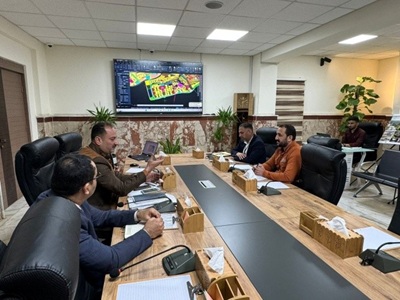Towards Environmental Sustainability: The Green Belt Project Around Anbar Governorate - Ramadi as a Model

Desert Studies Center - University of Anbar
Abstract
In a country suffering from desertification and climate change, the Desert Studies Center at Anbar University has taken proactive measures to protect the environment by adopting environmental governance principles. Through this approach, the center seeks to reduce pressures on fragile ecosystems by implementing comprehensive conservation strategies, most notably the preparation of a study on the green belt around the cities of Anbar Governorate, with Ramadi as a model. This initiative was developed through a series of steps, including effective cooperation with the Anbar Environment Directorate - the official body responsible for environmental protection in the governorate - and partnerships with relevant institutions and experts.
What distinguishes the Anbar Green Belt Project is its role as a protective shield for human health and the preservation of a healthy environment in desert cities constantly exposed to sand and dust storms. These storms have harmful effects on human health and the environment, given the fragility of ecosystems resulting from the decline of vegetation cover, the region's arid climate, low rainfall, high temperatures, and the governorate's vast area (138,579 square kilometers), 77.7% of which is desertified or at risk of desertification.
The project primarily aims to mitigate the effects of dust storms on the governorate's cities, agricultural lands, and production, halt environmental degradation, and protect biodiversity threatened by climate change. It also seeks to invest in parts of the green belt economically and recreationally by planting trees of economic value and developing recreational spaces near urban areas. Furthermore, the project is of paramount importance in fulfilling Iraq's obligations under international treaties and agreements, particularly the United Nations Convention to Combat Desertification and the Paris Agreement on Climate Adaptation.
Introduction
In response to the growing environmental challenges facing Anbar Governorate, particularly desertification, dust storms, and the effects of climate change, the Center for Desert Studies at the University of Anbar has proposed a strategic initiative entitled "The Green Belt Project around Anbar Governorate: The City of Ramadi as a Model." This study, submitted to the Anbar Environment Directorate, aims to establish a green buffer zone around the city of Ramadi. The project seeks to mitigate environmental degradation, protect biodiversity, and enhance the region's environmental, social, and economic resilience. It also aligns with Iraq's national commitments to international environmental agreements.
Study Details
A study titled "The Green Belt Project Around Anbar Governorate/Ramadi City as a Model," prepared by the Desert Studies Center at the University of Anbar, was submitted to the Anbar Environment Directorate for submission to the Environmental Protection and Improvement Fund for funding. Given the project's importance in addressing environmental challenges, it is crucial to note that this study is crucial to addressing environmental challenges.
Four meetings were held during 2024:
• The first meeting was held at the Anbar Environment Directorate headquarters on January 22, 2024.
• The second meeting was held on March 27, 2024, at the Municipality Directorate.
• The second supplementary meeting was held on May 21, 2024.
• The final meeting, which included a presentation of the final route of the Green Belt around the city of Ramadi, was held on November 25, 2024, at the Anbar Environment Directorate.
• This final meeting was attended by the Chairman of the Anbar Governorate Advisory Council, as well as directors and representatives of relevant local departments and institutions. The ministerial committee, represented by the Planning and Follow-up Department and the Projects Department at the Ministry of Environment, and the Planning and Follow-up Department in the Central Region, also attended.
The joint committee responsible for preparing the project, consisting of the Anbar Environment Directorate and the Desert Studies Center at Anbar University, reviewed the final route of the Green Belt (27 kilometers long and 120 meters wide) after completing the initial steps to unify the route and remove all objections, in cooperation with all relevant authorities in the governorate.
The head of the Anbar Governorate Advisory Board emphasized that the local government is continuously working to support such vital projects that contribute to finding radical solutions to address climate change manifestations, such as desertification and dust storms, and their impact on the environment.
The director of the Anbar Environment Directorate also emphasized that the proposed project is the first of its kind in Anbar Governorate, and that its implementation will represent an important opportunity to address the environmental challenges facing the governorate. It is considered one of the most strategic projects, combining improvements to the environmental, economic, and social reality of the region.
Meeting Links:
Ø First Meeting (22/1/2024):
https://www.uoanbar.edu.iq/DesertStudiesCenter/News_Details.php?ID=441
Ø Second Meeting (27/3/2024):
https://www.uoanbar.edu.iq/DesertStudiesCenter/News_Details.php?ID=467
Ø Supplementary Second Meeting (21/5/2024):
https://www.uoanbar.edu.iq/DesertStudiesCenter/News_Details.php?ID=487
Ø Final Meeting (25/11/2024):
https://www.facebook.com/share/p/16HAwwv6ws/
.jpg)
.jpg) .
.
Topics may interest
Afforestation and Establishment of Oases and Nature Reserves Along the Overland Hajj Route and the Al-Jadida Arar Border AreaIncreasing and Declining Wild Plant Species in the Western Desert of Iraq
A Study on the Status of Wild Medicinal Plants and Their Potential for Sustainable Development in the Desert Environment
National Cotton Development Program
Cotton Variety Development and Breeding Committee Meeting
Biogas Digester Project
Studying land resources in the areas surrounding Lake Haditha in the Western Iraqi Desert for comprehensive sustainable development
Implementing the Biogas Project